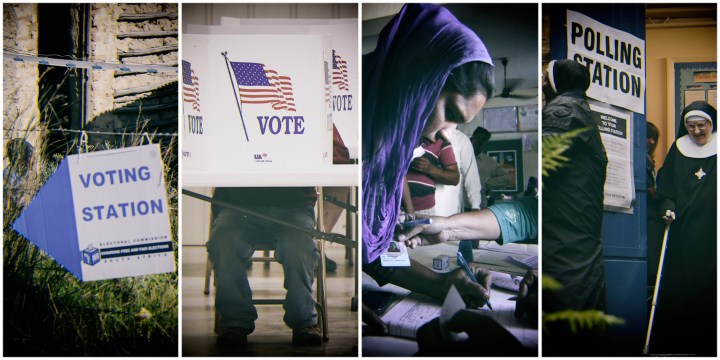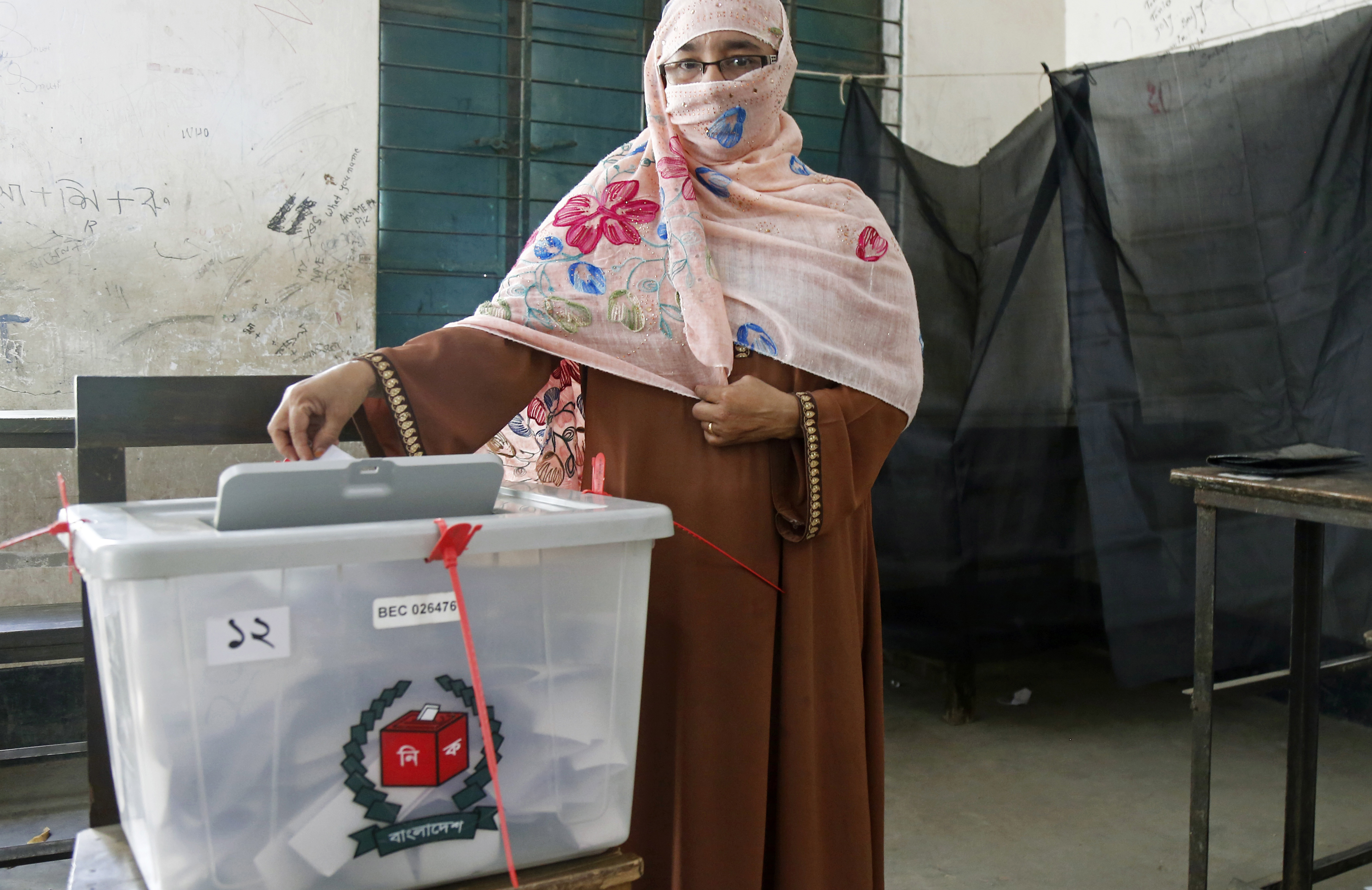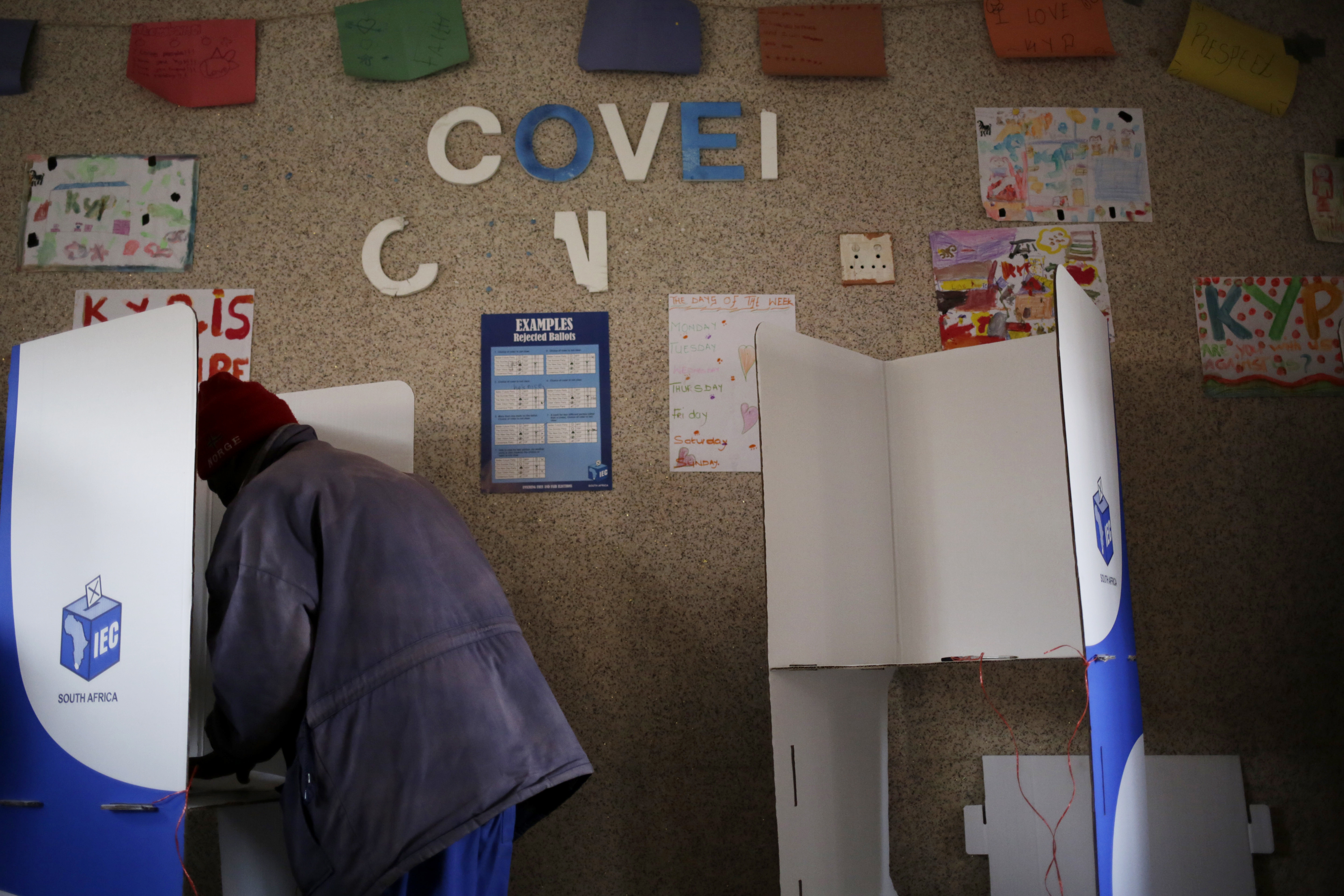ANALYSIS
Seventy countries will hold elections in 2024, but leaders seem incapable of solving pressing problems

The world hopes for a better quality of leadership as more than 70 nations go to the polls next year. But will the world actually gain real leadership in troubled times?
We are now just a few weeks from the start of 2024. Ostensibly, we should be celebrating the fact that more than 70 countries — representing around two billion voters — will be holding general elections in the new year.
This should be a cause for some celebration, given that this group of countries includes some of the most populous nations on Earth. The list includes South Africa, of course, but America, Britain, India, Indonesia, Bangladesh and Russia, among others, will also have their elections in 2024.
Despite such theoretically good signs, The Economist editor-in-chief Zanny Minton Beddoes offered some less than optimistic thoughts over what should otherwise leave us cheering for the democratic experiment.
As she wrote in her look ahead to 2024, “More than half the people on the planet live in countries that will hold nationwide elections in 2024, the first time this milestone has been reached. Based on recent patterns of voter turnout, close to 2bn people in more than 70 countries will head to the polls.
“Ballots will be cast from Britain to Bangladesh, from India to Indonesia. Yet what sounds like it should be a triumphant year for democracy will be the opposite.

A Bangladeshi woman casts her vote at a polling station in Dhaka on 30 December 2018. (Photo: EPA-EFE / Monirul Alam)
“Many elections will entrench illiberal rulers. Others will reward the corrupt and incompetent. By far the most important contest, America’s presidential election, will be so poisonous and polarising that it will cast a pall over global politics.
“Against a backdrop of conflict, from Ukraine to the Middle East, America’s future direction — and with it the world order American leadership has hitherto underwritten — will be on the line. It will be a nerve-racking and dangerous year.”
Not entirely filled with good cheer for the season, is she.
Of course, in Russia, the outcome is virtually predetermined, now that Vladimir Putin has announced his candidacy yet again.
Now, no one expects Putin to lose, and any real opponents to his re-election have been effectively silenced or are in prison. He won’t even have to win “Chicago style,” a phrase from the heyday of Chicago mayor Richard Daley’s political machine. It was characterised by an apocryphal but devoutly political realist phrase uttered on an election night that went along the lines of: “We’re going to keep counting these votes until they come out right.”
The basic idea behind machine politics has been for those in charge to craft the following bargain: They would deliver civic services as promised, but they would do so in neighbourhoods and precincts in exchange for voter loyalty. That allowed the leadership cadre to keep the patronage and looting machines well-oiled and working hard for their benefit. And as long as the snow was ploughed and the rubbish was picked up regularly, and young men guided towards a job, the machine was working well.
The nature of leadership
Now, given all these upcoming elections, such observations should inevitably guide us to the nature of leadership — in the abstract, as well as in its more concrete form.
Beyond judgements about good and evil rulers as defined in the Bible, and with divine retribution close at hand for those who misbehaved, the first sustained discussion of leadership in nation-states in the Western world comes from the Greek philosopher, Plato, although some Eastern thinking on rulers also predate Plato, as in the “Ramayana.”
In brief, Plato, in his “The Republic,” explored what rational, moral government should be, as he argued the best system would be what we now call rule by a wise philosopher-king.
He would be aided by the good advice from a council of elders for decision-making, as they drew from their deep well of experience. Plato (contrary to a usual view of ancient Athens as a city that invented and fully embraced democracy) was not a fan of elections or popularly selected (read: populist) leadership. For Plato, democratic rule almost inevitably decayed into the chaos of populism and mob rule.
Nearly two thousand years later, Italian diplomat, scholar, codifier of realpolitik, and sometime political exile, Niccolo Machiavelli, was similarly ill-disposed towards democratic values. In the most famous chapter of “The Prince,” he asked if a prince should aim to be loved or feared. In his answer, he leaned heavily towards the latter — in order for a ruler to stay in business. This was his view even if the costs included the alienation of affection by the prince’s subjects, or even the need for the prince to be prepared to use force if necessary in order to maintain control.
Wrestling with challenges like these about the nature of leadership has engaged the thoughts of constitution writers ever since.
In 1787, representatives of the newly independent and increasingly chaotic America gathered in Philadelphia to create a new constitutional arrangement. In so doing, they studied every example they could of republics that had gone south — classical Athens, republican Rome, early modern Venice, and the Dutch Republic.
They concluded there was a need for the various elected leaders to be balanced mutually to preclude the near-inevitable collapse into tyranny or mob rule. Accordingly, they created a web of shared and separated powers to prevent a new Caesar from riding roughshod over their nation.
In the two centuries-plus since that constitution was thrashed out, it has largely continued to work. But it has become, in many ways, ponderous and inefficient, especially in an era of acrimonious, contesting parties.
When riven by deep ideological differences and overweening personal ambition, problems arise that are a threat to the entire enterprise.
Or, as one of America’s founding fathers, Benjamin Franklin, had answered a questioner who wondered what the constitutional convention had actually constructed, Franklin reportedly replied, “A republic, if you can keep it.”
Now the question is being asked anew with the return of Trumpian populism.
Rightwing populism is gaining strength
Globally, as we all know, the 19th and 20th centuries saw the rise of new government approaches and experiments: liberal democratic traditions; Soviet-style democratic centralism; and Italian, German and other fascisms, as earlier forms of government began falling away or collapsed.
Following the end of the Cold War and the collapse of the Soviet Union and its empire, and based on some seriously misguided optimism and ahistorical thinking, the common assumption was that liberal democratic government and a more humane capitalism would continue to spread. It would eventually replace those other forms of government. Instead, goodness, peace and prosperity would inevitably prevail.
Earlier pronouncements like Italian dictator Benito Mussolini’s words from 1932, that “the liberal state is destined to perish,” would, soon enough, be consigned to that fabled ash heap of history.
But perhaps we should listen instead to the thoughts of Cambridge University Prof Mary Beard and her warnings about absolute power.
As an astute student of the classical world, in her newest book about the life of Roman emperors, she has written, “… but buried in the seemingly preposterous anecdotes of the emperor’s eccentricities are some very different, and equally chilling, terrors of autocracy. The terror of power without limits is one of those.” [Italics added] But in some places, it has never really been vanquished — or it is making a comeback.
How innocent we were then, when we all thought the end of history was just about upon us. Instead, what we now face is a jumble of populism and identitarian movements, often in common cause with the rise of new authoritarianism in countries around the globe.
There, rulers are increasingly first gaining power via the ballot box (and then trying hard to keep it), rather than arriving ceremonially as the man on “horseback.”
Across Europe, rightwing populism is gaining strength via the ballot box in places as different as the Netherlands and Slovakia. It has already significantly taken hold in Hungary and Italy, and such movements are becoming more visible in Germany as well.
Meanwhile, Turkey’s Recip Erdoğan and the religious zealots of Akbar Khamenei’s Iran conjoin religion and repressive rightwing ideas into a noxious blend.
And Benjamin Netanyahu’s governing alliance includes hardline religious parties that are now leading his government into carrying out devastating vengeance against Gaza in response to the barbaric Hamas attack in Israel on 7 October.
Meanwhile in India, Narendra Modi, while adhering to democratic processes, continues to press on with his own strongly identitarian ideal, and he, too, is heading towards a likely re-election in 2024.
And Vladimir Putin has put his re-election in the service of a right-wing authoritarianism that is blended with a mystical allegiance to Mother Russia, very old-style religion, and the illusions of a greater Slav community that has brought him to attacking Ukraine.
In China, meanwhile, Xi Jinping has fostered Han patriotism (as opposed to the separate identities of Uighurs and Tibetans). He has combined that with a growing assertion of a need for greater military strength, with the latter couched as an antidote to his often-noted hundred years of humiliation at the hands of the West and as a countermeasure to the possibility of any future threats to China.
He, too, has determined that he should rule forever.
In Latin America, the most recent example is Argentina’s newly inaugurated President Javier Milei’s startling win – a man embracing the manner and many of the ideas of Donald Trump.
And that, inevitably, brings us to the United States and Donald Trump.

A man dressed as Uncle Sam votes at Public School 59 on the eastside in New York City on 8 November 2016. (Photo: EPA / Peter Foley)
Looking ahead to America’s general election in 2024, The Economist adjudged, “The strategy of Mr Trump, a man never confused with a policy wonk, will be to whip Republicans into a state of frenzy. His campaign rallies will echo the ‘American carnage’ that he invoked in his first inaugural address: that Mr Biden is threatening to destroy America by failing to secure the southern border, failing to curtail crime or drug overdose deaths, and giving in to the leftist flank of his party, which aims to turn America into a godless haven for abortionists, criminals, the diversity-equity-and-inclusion bureaucracy and trans people.
“Rather than accept his loss in 2020, Mr Trump managed to convince most of his supporters that the election had been stolen. When the alternative to the Oval Office is likely to be a prison cell, his rhetoric will be even more extreme and corrosive to democracy in 2024.”
Those elements of identitarianism (to a mythic time when (white) men were men and everyone else tugged their forelock) and patriotic fervour are a heady brew. Trump is likely to win his party’s nomination for president, and there is a decent chance (assuming he stays out of jail for his various misdeeds) he will triumph in the upcoming election where he has “joked” he will be a dictator for a day when he comes into office, in order to crush his opponents.
Meanwhile, in South Africa, facing its election between May and August, the electorate seems sufficiently unimpressed with its choices so far that it is likely the downward trend of those who will actually vote seems foreordained.
As The Economist adds from its global 2024 preview, “The lack of alternatives to the ANC reflects the poor health of South African politics. Some 70% of South Africans say they are dissatisfied with the way democracy works. A stunning 72% say they would ditch democracy for an unelected leader if he — and in the patriarchal world of South African politics, it would be a he — could deliver jobs and combat crime.” [Italics added]
As for Africa’s Sahel region, the journal added that this stretch of countries “… takes in jihadist conflict in Burkina Faso, Mali and Niger; rampant banditry in northern Nigeria; the fight against the terrorists of Boko Haram and its offshoots by four countries around Lake Chad; civil war in Sudan; smouldering ethnic conflict in northern Ethiopia; and, to the south, the terrorists of al-Shabab in Somalia.
“The devastation is shocking. In Mali, Niger and Burkina Faso, known as the central Sahel, more than 10,000 people were killed in armed conflict in 2022. By September 2023 that total had already been surpassed.
“In northern Nigeria, more than 7,000 people were killed in 2022. In five months of conflict in Sudan, more than 9,000 people were slaughtered. A conservative tally of the number of people forced from their homes in the region, excluding Somalia, comes to 15m.”
There is little chance of an early end to all the death and destruction.
Deep hunger for good leaders
Much of what has been noted above may be attributed to a failure of would-be leaders to exert real leadership.
Often it is leaders and would-be leaders appealing to or inflaming the worst instincts of their supporters, but with slight intentions of serving populations in meaningful ways. Servant leadership is far from their minds.
South Africans are seeing new fissiparous parties emerging that are not part of the traditional ANC triple alliance or are separate from the Democratic Alliance. In addition, some respected names have quit their old ANC allegiance in disgust.
But at least so far, there is little evidence of a major upwelling of support for something new among a tired, frustrated electorate.
Meanwhile, in America, the polls say voters as a whole are unenthusiastic about a rematch between two elderly politicians whose best days are likely behind them.
And some voters seem to be yearning for choices as there are already several small parties on the left, as well as something called “No Label” which may be an indicator of that lack of enthusiasm.
Over in Russia, to reclaim the mantle of an earlier leader, it should not be a surprise there is a modest groundswell to re-rename the city of Volgograd as Stalingrad once again. It already gets a name switch several days a year.
This city on the Volga River was the scene for an epic World War 2 battle that became a turning point for the destruction of the German army as Josef Stalin had virtually willed his military to defeat the Germans at his namesake city. No surrender was to be permitted.
Eight years after Stalin’s death, the name of the city reverted to its earlier name. Now, Putin is seeking ways to inject yet a deeper sense of patriotism in what he calls his invasion of Ukraine a struggle against the West that is seeking to destroy Russia.
A reach-back to the site of an earlier life-and-death struggle fits with that narrative.
In fact, the still-independent Russian news service, Meduza, says a permanent name change may happen once Putin is reelected in 2024. Making such a change would cement his association with the “man who won the Great Patriotic War” — but who also sentenced millions to Gulag prisons and work camps when they disagreed with him in some way.

A man casts his votes in Kliptown during the local municipal elections in Soweto, Johannesburg, on 3 August 2016. (Photo: EPA / Cornell Tukiri)
Such renaming exercises serve deeper purposes. We continue to see this here in South Africa as an effort to draw attention to a list of national heroes (perhaps to help current leadership shine by some reflected glory), as with the recent renaming of William Nicol Drive in northern Johannesburg to Winnie Madikizela Mandela Drive. (Nicol had few supporters in preserving the previous name.)
As an aside, in America, there is a somewhat similar dynamic, but one with an interesting twist. Military bases that many years earlier had been named for Confederate generals as a sop to Southern sensibilities are now — finally — getting relabelled from a roster of authentic military heroes, instead of those who had taken up arms against their own country in the Civil War.
Too often, around the world, we construct our ideas of high-quality leadership in a way that makes it nearly impossible to recognise the human that resides inside that heroic statue. Sometimes people are determined to memorialise a leader, despite some obvious frailties, flaws, and failures.
In America, Parson Weems, an early 19th-century minister and writer, created a popular word portrait of George Washington — the country’s first president and victorious general in the country’s independence struggle — in which he was virtually blemish-free, as in – “I cannot tell a lie.”
Weems’ books were useful for the indoctrination of children and the encouragement of adults to continue to revere the man’s memory as the apogee of civic culture.
In something of the same way, South Africans, most of them at least, have fully and enthusiastically embraced the memory of the late Nelson Mandela as a man who bore near-protean virtues and political mastery, who pulled the country back from the abyss, and the likes of whom is now nowhere to be found. There are now hundreds of books about him and a large roster of places named for him as well.
The continuing adulation of Nelson Mandela a decade after his passing is a clear demonstration of a deep global hunger for leaders who can actually deliver real leadership to solve real, pressing problems.
Sadly, however, the current crop of leaders almost everywhere seems incapable of delivering on such a deeply felt need by so many. DM



















Populism is a two sided coin. It is a dangerous uncontrollable phenomenon but as anybody who has watched Who Wants To Be A Millionaire knows, the audience is usually right. The swing to the right in Europe for instance has been very much driven by the unwelcone flood of immigration that has changed the character of those countries.
Yes .. if only the current maharajah of the UK (who knows for how long!) had stopped all those ‘boats’ from his shores … and those of the various neighbours across the channel, from leaving their shores centuries ago, to ‘civilise’ the heathens of those of distant climes and regions of the world (including his parents’ motherland) … he wouldn’t today be trying to stop them from coming home … to roost .. so to speak . Karma is a .itch !
Sadly, however, as highlighted by the DM, the current crop of leaders everywhere are incapable of delivering on such an ever-growing tidal wave of a deeply felt need for truth, integrity, honour and basic human respect, characteristics which are essentially required for genuine leadership and which are now urgently needed globally by so many at this troubled time on our blue planet.